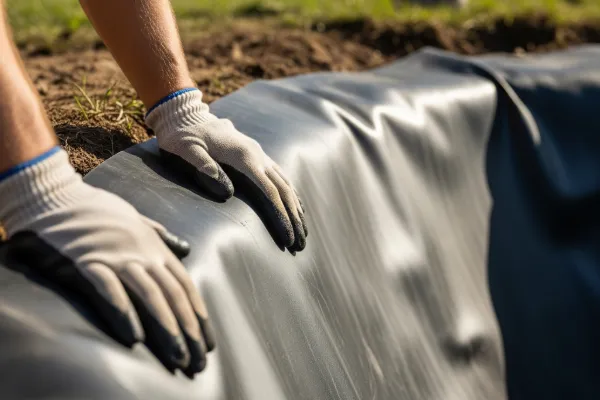
EPDM Pond Liner: Benefits, Uses, and Installation Guide for 2025
Introduction: Why EPDM Pond Liners Are in Demand
The success of any pond or water feature depends on its foundation—the liner. Without a durable liner, leaks, cracks, and structural issues can occur, leading to costly maintenance.
EPDM pond liners have become the trusted choice for homeowners, landscapers, and contractors because they offer unmatched durability, flexibility, and eco-friendliness. Whether it’s a small backyard pond or a large commercial water garden, EPDM delivers reliable performance for decades.
What is an EPDM Pond Liner?
EPDM (Ethylene Propylene Diene Monomer) is a synthetic rubber material that is flexible, resilient, and highly resistant to weather elements.
Key Features:
Extremely flexible, even in freezing temperatures
UV- and ozone-resistant for outdoor durability
Safe for fish, aquatic plants, and wildlife
Long-lasting performance (20–30 years lifespan)
Easy to install and shape to any pond design

Benefits of EPDM Pond Liners
Long-Term Durability – With proper installation, EPDM liners resist tears, punctures, and weather damage.
Eco-Friendly – Non-toxic material that’s safe for fish, plants, and the surrounding ecosystem.
Design Flexibility – Adapts to ponds of any shape, size, or depth.
Low Maintenance – Requires minimal upkeep compared to concrete or PVC alternatives.
All-Weather Performance – Performs well in both hot summers and cold winters.
EPDM Pond Liner Installation Guide
Step 1: Plan & Measure
Outline pond shape with a rope or hose
Calculate liner size with depth and overlap included
Step 2: Excavate & Prepare
Dig pond area to the desired depth
Remove sharp stones and debris
Step 3: Add Underlayment
Lay geotextile underlayment or a sand base
Prevents punctures and increases liner lifespan
Step 4: Position EPDM Liner
Gently place liner into pond hole
Allow extra overlap at edges for securing
Step 5: Secure & Finish
Anchor edges with rocks, pavers, or edging materials
Slowly fill with water, smoothing out folds as you go
Common Mistakes to Avoid
Skipping underlayment protection
Cutting liner too short for pond size
Using harmful adhesives or sealants
Not leaving enough overlap at pond edges
Applications of EPDM Pond Liners
Koi Ponds & Fish Habitats – Provides a safe, non-toxic environment.
Garden Water Features – Ideal for decorative landscaping ponds.
Commercial Water Gardens – Durable enough for large-scale projects.
Rainwater Retention Ponds – Supports sustainable water management.
Fountains & Streams – Flexible for custom shapes and flowing designs.
FAQs About EPDM Pond Liners
Q1: Is EPDM safe for aquatic life?
Yes, EPDM is 100% fish- and plant-safe.
Q2: How long do EPDM liners last?
With proper installation, 20–30 years or more.
Q3: Can I install EPDM myself?
Yes, small ponds are DIY-friendly. Larger or complex projects are best handled by professionals.
Q4: Do EPDM liners require underlayment?
Yes—always use underlayment to protect against punctures.
Conclusion: A Trusted Choice for Lasting Ponds
An EPDM Pond liner is the foundation of a strong, eco-friendly, and long-lasting water feature. Its flexibility, resilience, and safety make it a favorite for both homeowners and contractors.
At Best Construction Products (BCP Inc.), we provide high-quality EPDM pond liners designed for both small decorative ponds and large-scale landscaping projects.
Contact BCP Inc. today to learn more about our EPDM pond liners and how we can help with your next water feature project.